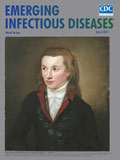
Volume 25, Number 3—March 2019
Research Letter
Healthcare Provider Discrimination toward Pregnant Women with Rifampin-Resistant Tuberculosis
On This Page
Abstract
Little is known about the treatment experiences of pregnant women with rifampin-resistant tuberculosis. We conducted qualitative interviews with 10 women who had this condition; 9 reported facing discrimination from healthcare providers. Our findings underscore an urgent need to ensure a human-rights–based, patient-centered approach for women with rifampin-resistant tuberculosis who are pregnant.
We report discrimination by healthcare providers toward pregnant women with rifampin-resistant tuberculosis (TB) in KwaZulu-Natal Province, South Africa. Pregnant women are at increased risk for all forms of tuberculosis (1). Experience in caring for pregnant women with rifampin-resistant TB is limited (2–4), and little is known about their experiences during treatment (5).
In 2016, a total of 3,280 patients at the King Dinuzulu Hospital Complex in KwaZulu-Natal Province were started on treatment for rifampin-resistant TB; 47% of these patients were women, many in their childbearing years (6). During 2016–2017, we conducted qualitative interviews with 10 women as part of an observational study on bedaquiline use during pregnancy, with the goal of describing treatment challenges.
All 10 of the women were postpartum and ranged in age from 22 to 37 years. The mean number of pregnancies was 3 (range 2–5). Two women were on rifampin-resistant TB treatment when they became pregnant, 7 women had rifampin-resistant TB diagnosed during pregnancy, and 1 had rifampin-resistant TB diagnosed and found out she was pregnant at the same time. Nine of the 10 women reported experiencing discrimination while accessing healthcare, either from the antenatal care providers (9 women), the TB care providers (4 women), or both (4 women). (Rifampin-resistant TB and antenatal care services are not integrated in this setting.)
The reported discrimination faced by the women while accessing antenatal care and during delivery was largely based on a fear of resistant TB transmission. Even when the women were no longer infectious, they were forced to wear masks, the nurses caring for them began wearing gloves, and they were isolated during the delivery and in the postpartum period. Three women reported that they were not evaluated after delivery and that they were left alone without food for themselves or milk for their newborns. Women also reported that they felt pressured into considering pregnancy termination by their antenatal care providers, who sometimes referred to their unborn children as “that thing”; however, none of the women interviewed terminated their pregnancy.
Most of the women interviewed also reported discrimination from rifampin-resistant TB care providers. Some providers told the women they were “foolish” for becoming pregnant during treatment. Several of the women also reported that some care providers ridiculed them for continuing with their pregnancies, stating “We don’t know what [you] will give birth to.” Some women were offered incomplete treatment regimens (e.g., regimens that were missing >1 drugs for part of the treatment period, including ethionamide, injectable agents, or bedaquiline). Some women experienced a delay in the start of rifampin-resistant TB treatment or were started on first-line therapy even though they had a confirmed diagnosis of resistant TB.
Although the number of women in this study is small and their experiences might not be representative of all pregnant women, the common experience of reported discrimination is cause for concern. Proper infection control practices are needed to reduce nosocomial and community transmission of rifampin-resistant TB, but most of these women reported that the discrimination occurred even after they were unlikely to be infectious (7).
Some of the discriminatory acts might have placed these women and their newborns at increased risk for poor health outcomes, colored their perceptions of the healthcare systems, and adversely affected future healthcare-seeking behavior for themselves and their children. Additional exploration of this phenomenon is needed along with practical solutions to ensure pregnant women with rifampin-resistant TB receive the best possible care during this challenging period of their lives.
Dr. Loveday is a health systems researcher at the South African Medical Research Council in Durban, South Africa. She specializes in health systems research and has done extensive work in drug-resistant tuberculosis over the last 2 decades.
Acknowledgments
We acknowledge the KwaZulu-Natal Department of Health. We gratefully acknowledge the participants in the study.
The work was funded by the Medical Research Council of South Africa, the National Research Foundation, and a United Way Worldwide grant made possible by the Lilly Foundation on behalf of the Lilly MDR-TB Partnership. The funders had no role in study design, in the collection, analysis, and interpretation of data; in the writing of the report; or in the decision to submit the paper for publication. All researchers were independent of funders and sponsors.
The study protocol was approved by the Ethics Committee of the South African Medical Research Council (reference no. EC17-6/2016), KwaZulu-Natal Department of Health and King Dinuzulu Hospital, Durban. All participants provided written informed consent and were reimbursed for their time and travel.
All authors had full access to all the data in the study. M.L., S.H., and J.F. conceived and designed the study; M.L. and S.H. conducted the study; M.L., S.H., and J.F. analyzed the data; and M.L., S.H., and J.F. wrote the paper. M.L., as corresponding author, had final responsibility for the decision to submit for publication. The final version of the manuscript has been read and approved by all the authors, and the requirements for authorship have been met. Each author believes that the manuscript represents honest work.
References
- Khan M, Pillay T, Moodley J, Ramjee A, Padayatchi N. Pregnancies complicated by multidrug-resistant tuberculosis and HIV co-infection in Durban, South Africa. Int J Tuberc Lung Dis. 2007;11:706–8.PubMed
- Pillay T, Khan M, Moodley J, Adhikari M, Padayatchi N, Naicker V, et al. The increasing burden of tuberculosis in pregnant women, newborns and infants under 6 months of age in Durban, KwaZulu-Natal. S Afr Med J. 2001;91:983–7.PubMed
Original Publication Date: 2/6/2019





















.png)












No hay comentarios:
Publicar un comentario